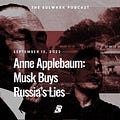The billionaire was duped by Russian nuclear propaganda, but he's not the only one in the West who worries about provoking Russia by helping Ukraine. Plus, Putin's role in the far-right echo chamber, and why Romney stood up to Trump. Anne Applebaum joins Charlie Sykes for the weekend pod.
show notes:














